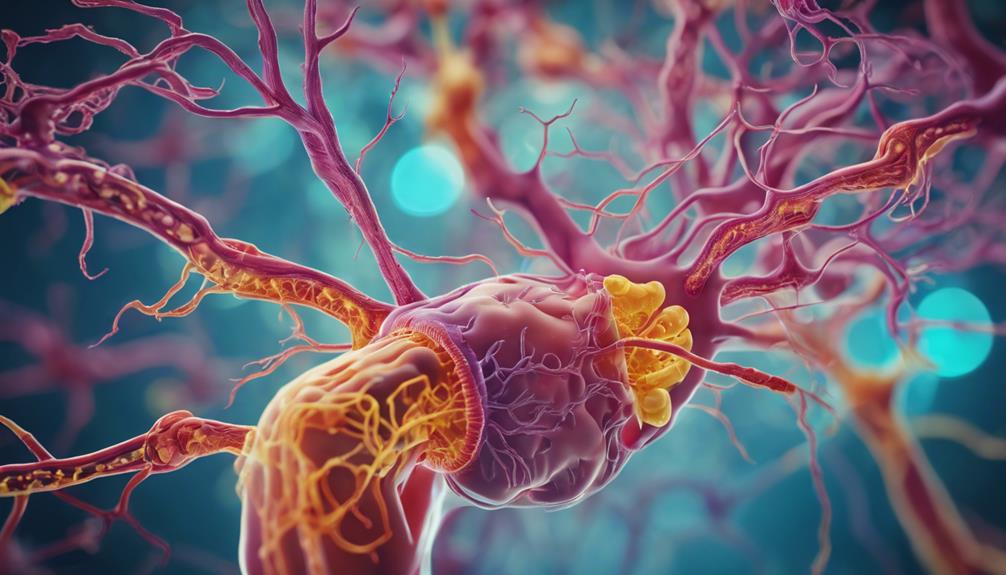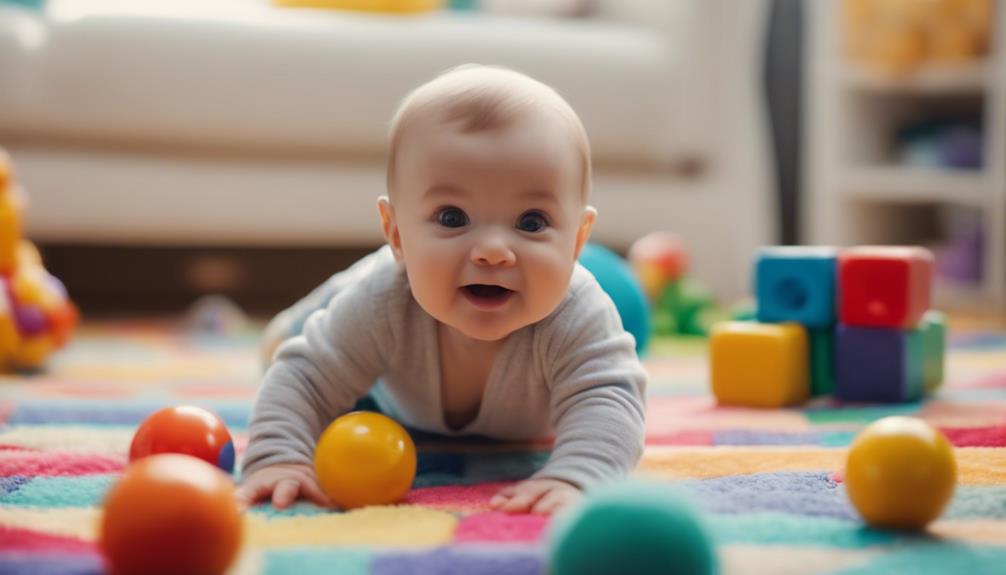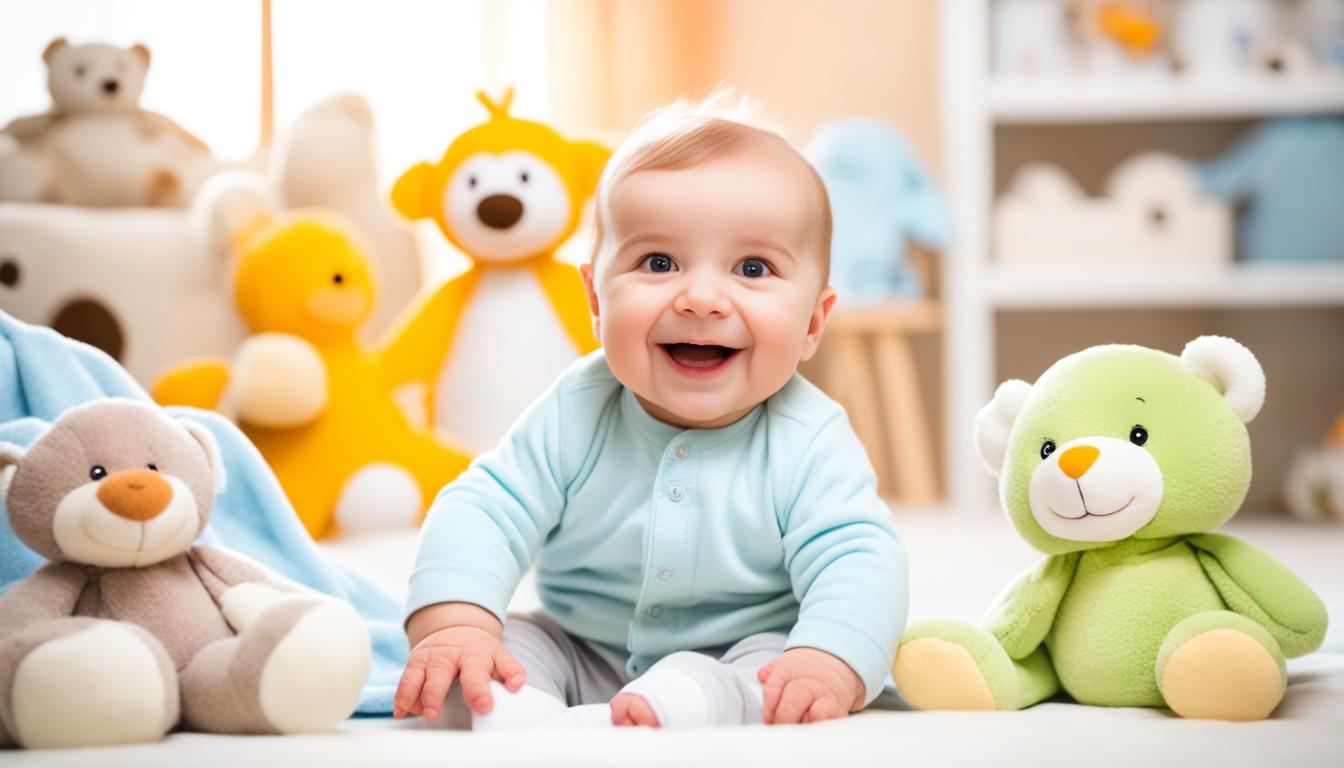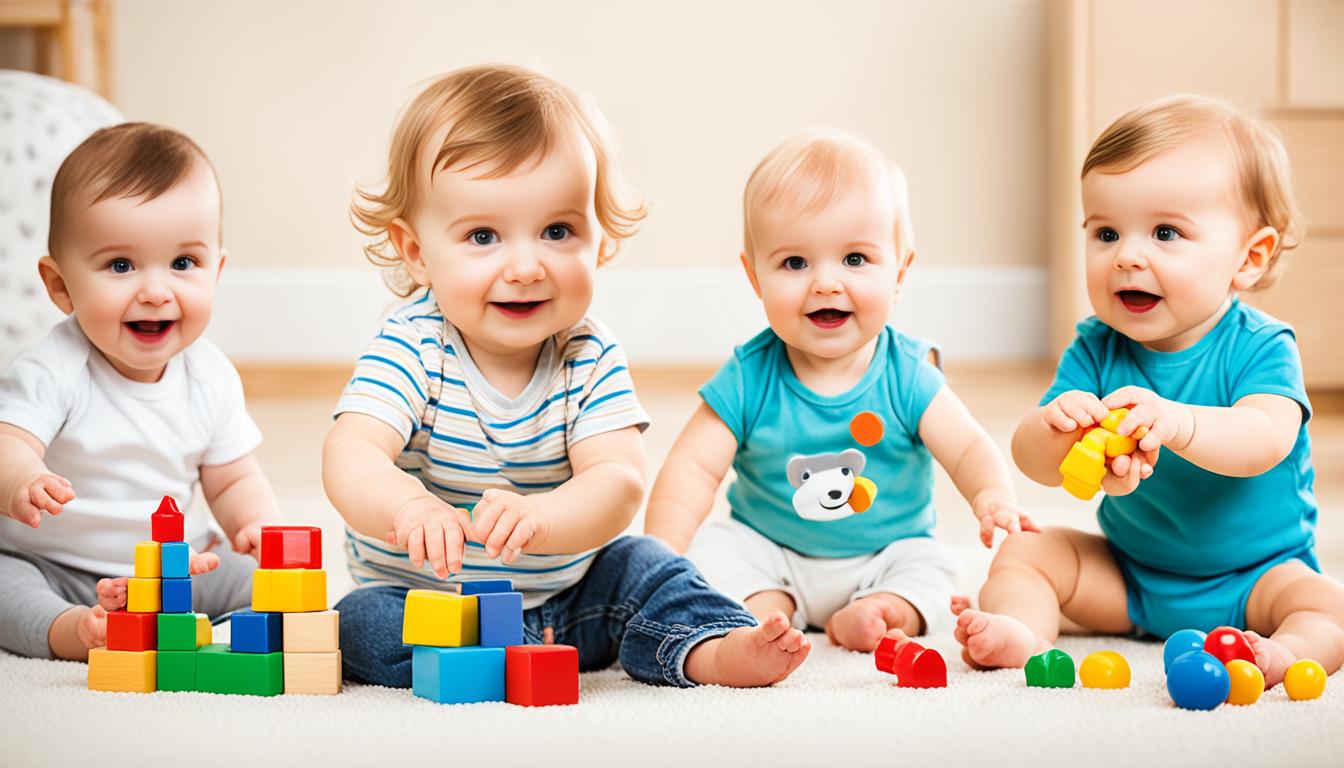When it comes to the development of a baby’s nervous system, it is crucial to understand the complex processes that take place during pregnancy. Neural tube formation and synapse growth are essential for shaping cognitive abilities and motor functions in infants. The brain starts to develop around 3 weeks after conception, with neural crest nerves forming connections with organs, eyes, and ears by 8 weeks. These connections play a vital role in sensory and motor functions. Nerve cells communicate through synapses, which are crucial for learning and memory. Proper synapse formation is key in shaping the developing nervous system. Explore more about this intriguing development to expand your knowledge.
Key Takeaways
- Neural tube forms at 3 weeks, initiating brain development.
- Synapse formation crucial for learning and memory.
- Early brain network sets foundation for neural pathways.
- Positive interactions build strong neural connections.
- Singing and reading stimulate brain activity and language acquisition.
Brain Growth During Pregnancy
Early in pregnancy, the baby's brain undergoes significant growth as the neural tube forms around 3 weeks post-conception. This pivotal stage marks the beginning of fetal brain development, setting the foundation for the intricate network of neural connections that will shape the nervous system.
The neural tube, which eventually develops into the brain and spinal cord, is essential for early brain development. As the pregnancy progresses, nerves branch out from the neural crest along the developing neural tube, establishing connections with muscles, organs, eyes, and ears by around 8 weeks. These connections play a fundamental role in facilitating sensory and motor functions essential for the baby's growth and well-being.
Proper formation of the neural tube and neural connections is critical for ensuring the healthy development of the baby's brain and nervous system. Adequate folic acid intake during pregnancy is recommended to support the proper development of the brain and spinal cord, emphasizing the importance of early neural development for the growing fetus.
Nerve Connection Formation
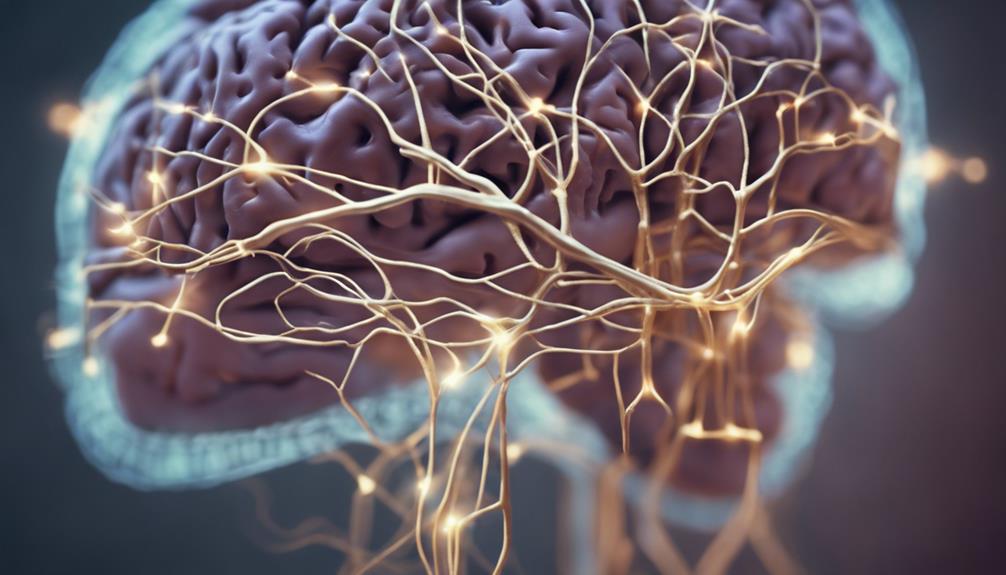
During the first trimester of pregnancy, the essential process of nerve connection formation begins in your baby's developing nervous system.
Neurons start to grow and establish synapses, vital junctions that allow for communication between nerve cells.
This early stage sets the foundation for the intricate brain network that will continue to expand throughout your baby's development.
Neuron Growth Process
When neurons grow, they form connections known as synapses, facilitating communication between nerve cells through electrical and chemical signals. These synapses are essential for the intricate network of nerve cells in the brain, allowing for the processing of information and transmission of signals. The formation of synapses is a critical aspect of neuron growth, shaping the developing nervous system and influencing various functions such as learning, memory, and overall brain function.
To better understand the significance of neuron growth and synapse formation, let's explore a comparison table:
| Neuron Growth Process | Importance |
|---|---|
| Synapse Formation | Critical for learning and memory |
| Nerve Cells | Facilitate communication |
| Communication | Through electrical and chemical signals |
| Brain Function | Impacted by the growth and strengthening of synapses |
| Development | Shapes the developing nervous system |
As neurons establish these crucial connections and networks, they lay the foundation for proper brain function and cognitive abilities.
Synapse Formation Importance
As neurons grow and establish connections through synapse formation, the significance of these nerve connections becomes apparent in facilitating effective communication within the developing nervous system.
Synapse formation is essential for nerve cells to transmit electrical and chemical signals, enabling the brain to process information, learn, and form memories. These synaptic connections play a pivotal role in ensuring proper brain function and development.
Additionally, synaptic pruning, the process of eliminating unnecessary synapses, refines neural circuits for peak brain performance. By selectively strengthening essential connections and removing less crucial ones, synaptic pruning enhances the efficiency of neural communication.
This refinement process is crucial for shaping the developing brain's network and improving its overall functionality. Ensuring adequate synapse formation and appropriate pruning during early nervous system development sets the foundation for efficient neural pathways, enabling effective communication and information processing within the intricate neural networks of the growing brain.
Early Brain Network
Nerve connections in the early brain network start forming as early as the first trimester of pregnancy. During this crucial period of development, the neural tube closes around 6 weeks, signaling the emergence of vital brain regions within the developing nervous system.
By 8 weeks, a complex network of nerves spreads throughout the body, laying the groundwork for future sensory and motor functions. Reflexes, fundamental for survival, are already established by 12 weeks as part of the intricate web of the developing nervous system.
Furthermore, myelin development, which is essential for the efficient transmission of nerve signals, commences around the 20-week mark, further enhancing the maturation of the growing nervous system.
Activity in the Cerebral Cortex
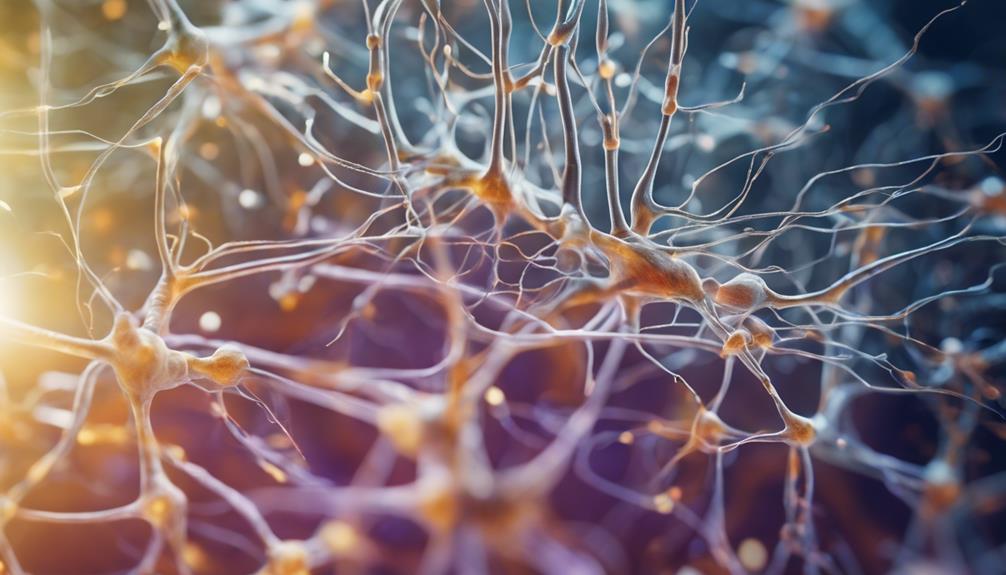
Engage your understanding of the developing baby's nervous system by exploring the dynamic activity within the cerebral cortex. The cerebral cortex, responsible for higher cognitive functions, is divided into lobes specialized in sensory perception, language processing, and motor control. Neuronal networks within the cerebral cortex form intricate connections to process and integrate environmental information supporting learning and memory. As the brain matures, activity in the cerebral cortex increases, enabling more complex thinking and problem-solving skills to develop.
| Cerebral Cortex Facts | |
|---|---|
| Responsible for | Higher cognitive functions |
| Lobes | Specialized in sensory perception, language processing, and motor control |
| Neuronal Networks | Form intricate connections to process and integrate environmental information |
| Brain Maturation | Increases activity in the cerebral cortex for enhanced processing capabilities |
| Surface Area | Folds and grooves increase surface area, allowing for more brain matter to fit within the skull |
Role of Supportive Interactions
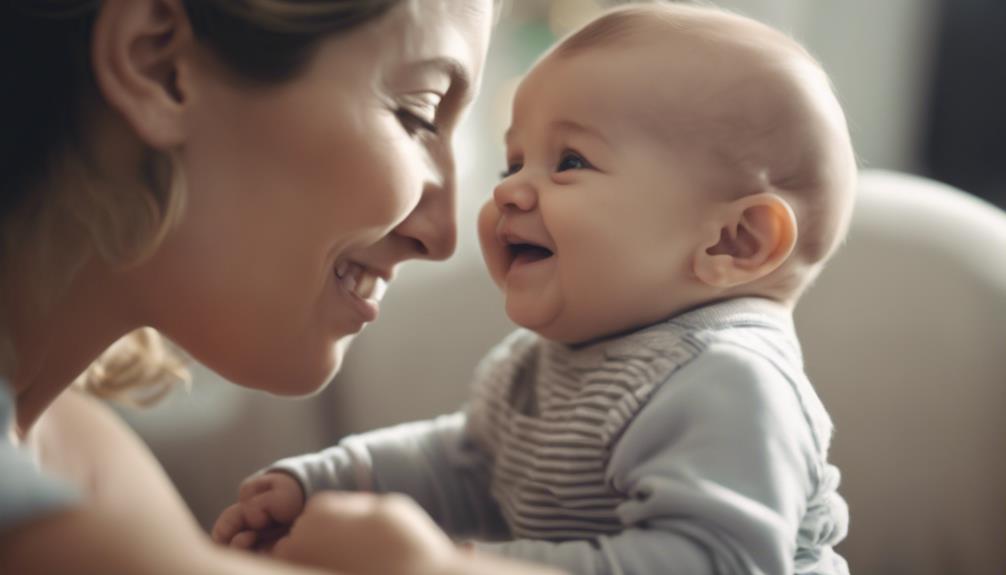
Supportive interactions with caregivers greatly impact the development of a baby's nervous system. These interactions are crucial for the baby's neural connections and emotional regulation.
Here are five key points to keep in mind:
- Positive and loving interactions help in building strong neural connections in the baby's brain.
- Engaging in activities like talking, singing, playing, and cuddling fosters healthy nervous system development.
- Responsive caregiving promotes emotional regulation and stress management in infants.
- Creating a safe and nurturing environment is essential for best nervous system development in babies.
- The quality of caregiver interactions directly influences the baby's ability to regulate emotions and cope with stress.
Importance of Singing and Reading

Singing to your baby aids in developing their auditory processing skills and language acquisition. Reading to them enhances cognitive development and fosters emotional bonding. These activities play an important role in stimulating brain activity, enhancing memory formation, and helping babies recognize patterns, rhythms, and tones. All of these aspects are essential for neural connections.
Singing for Brain Development
Utilizing music and reading in your interactions with babies plays an important role in their brain development by fostering neural connections and enhancing various cognitive skills.
Singing to your baby not only entertains them but also aids in their neural development. The soothing rhythm and melody of songs can help with language acquisition, emotional regulation, and strengthening the bond between you and your little one.
Additionally, reading to your baby from an early age is essential for promoting early literacy skills and instilling a love for books and learning. Making singing and reading a part of your daily routine can have lasting positive effects on your baby's brain development.
- Singing stimulates neural connections in the baby's brain.
- Musical experiences aid in language development and emotional regulation.
- The rhythm and melody of songs enhance memory and cognitive skills.
- Reading fosters early literacy skills and a passion for learning.
- Daily incorporation of singing and reading has long-lasting benefits on baby brain development.
Reading Boosts Cognitive Skills
Reading to babies not only enhances their cognitive skills but also boosts their language development and overall brain function. Regular reading sessions with infants have been shown to greatly improve their vocabulary and comprehension skills, setting a strong foundation for early literacy.
Engaging in storytelling activities not only supports brain development but also strengthens the bond between parent and child. When you read aloud to your baby, you expose them to various language patterns, sounds, and emotions, which in turn aid in their cognitive growth.
Language Acquisition Benefits
Incorporating singing and reading into your interactions with babies can greatly enhance their language acquisition skills. By exposing babies to different sounds, rhythms, and vocabulary, singing and reading play an important role in supporting early learning and brain development.
Here are some key benefits of incorporating singing and reading into your routine with babies:
- Exposing babies to a variety of sounds and words aids in language acquisition.
- Reading aloud helps babies develop listening skills essential for language processing.
- Singing to babies not only enhances language development but also fosters emotional bonding and cognitive skills.
- Engaging in interactive reading and singing activities stimulates babies' brains, promoting early language skills.
- The critical language acquisition period is enriched by the exposure to diverse sounds and vocabulary through singing and reading.
Impact of Emotional Development

Understanding the impact of emotional development on babies is essential for fostering healthy social interactions and relationships. Emotional development in infants is closely tied to the formation of secure attachments with caregivers. This foundation of secure attachments lays the groundwork for positive emotional experiences, contributing to the development of healthy emotional regulation and coping skills. Responsive caregiving plays a crucial role in supporting babies' emotional development by creating an environment where they feel safe, loved, and understood. Early childhood education often emphasizes the importance of loving relationships and responsive caregiving to promote emotional well-being in infants. These early emotional experiences have a lasting impact on the brain's ability to process and regulate emotions throughout life, highlighting the significance of nurturing emotional development in the early stages of a child's life.
| Key Points | Details |
|---|---|
| Secure Attachments | Crucial for forming healthy emotional development and social interactions. |
| Responsive Caregiving | Supports babies in feeling safe, loved, and understood, fostering emotional well-being. |
| Early Childhood Education | Emphasizes the importance of loving relationships and responsive caregiving for infants. |
Cognitive Development Benefits

To fully grasp the significance of baby nervous system development, consider the cognitive benefits it offers for enhanced learning abilities and problem-solving skills.
The proper development of the nervous system in infants plays an essential role in shaping their cognitive functions and overall brain capabilities. Here are five key ways in which baby nervous system development contributes to cognitive growth:
- Establishment of neural connections that support cognitive functions.
- Improved memory formation and retention.
- Enhancement of problem-solving skills through well-developed neural pathways.
- Better communication between brain cells, promoting advanced cognitive skills.
- Foundation for language acquisition and critical thinking abilities.
These benefits underscore the critical importance of early nervous system development in shaping a child's cognitive abilities and preparing them for future learning and intellectual challenges. By nurturing the nervous system in babies, parents and caregivers can support the building blocks of cognitive development that will benefit the child throughout their life.
Creating a Stimulating Environment

For essential baby nervous system development, surround your infant with a stimulating environment that encourages exploration and sensory-rich experiences. Providing colorful toys, music, and varied textures can promote your baby's brain development and help in creating neural connections within their developing nervous system.
Encourage exploration through safe and engaging activities to assist in the development of cognitive skills and further strengthen neural connections. Interactive play, like peek-a-boo or naming objects, not only supports language development but also stimulates your baby's nervous system.
Age-appropriate toys that promote sensory exploration, such as rattles or soft books, can enhance fine motor skills and aid in sensory processing. By creating a safe and nurturing environment where your baby can freely explore and interact with their surroundings, you're fostering healthy nervous system development and overall well-being.
Promoting Optimal Brain Development

Engage actively with your baby through daily interactions to promote excellent brain development and cognitive growth. Early development is a critical period for shaping the foundation of your baby's brain. By engaging in activities that stimulate brain connections, you can help foster the growth of brain cells and neural connections.
Here are five ways you can promote ideal brain development in your baby:
- Talk to Your Baby: Regularly speaking to your baby helps in language development and strengthens neural pathways.
- Sing Songs: Singing to your baby can aid in memory retention and emotional bonding.
- Read Aloud: Reading to your baby exposes them to new vocabulary and enhances cognitive skills.
- Play Together: Engaging in interactive play helps in developing motor skills and problem-solving abilities.
- Practice 'Serve and Return': Responding promptly to your baby's cues fosters a sense of security and supports healthy brain wiring.
Frequently Asked Questions
How Does the Nervous System Develop in Infants?
During infancy, your nervous system develops rapidly. Nerves branch out from the neural tube around 8 weeks, with myelination starting at 20 weeks. By 28 weeks, your senses begin to form, and reflexes are already in place by 12 weeks.
What Is Important to a Child's Neurological Development?
To nurture your child's neurological development, engage consistently in stimulating activities like reading, playing, and exploring. These interactions shape the brain's wiring, fostering cognitive growth and emotional well-being, ultimately laying a strong foundation for their future.
How Do I Know My Baby's Brain Is Developing?
To know your baby's brain is developing, watch for milestones like tracking objects, grasping, babbling, smiling, problem-solving, and memory growth. These indicate healthy brain progress in areas like motor skills, language, social cues, and cognitive abilities.
At What Point Does a Child's Nervous System Begin to Develop?
Your child's nervous system starts developing around 3 weeks after conception. Nerves branch out by 8 weeks, reflexes form by 12 weeks, myelin develops by 20 weeks, and senses like hearing, sight, smell, and taste arise by 28 weeks.
Conclusion
As you continue to nurture your baby's nervous system development, remember that every interaction, every song sung, and every story read plays a crucial role in shaping their growing brain.
Just like a garden needs sunlight and water to flourish, your baby's brain needs love and stimulation to thrive.
So, keep talking, keep playing, and keep engaging with your little one, for every moment is a building block towards a brighter future.

